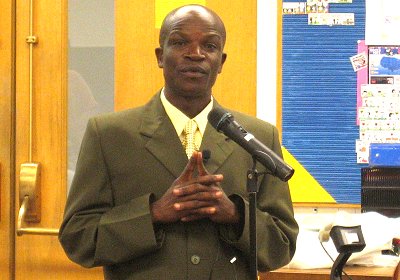- By Dan Veaner
- Around Town
 Print
Print  In last week's installment of our exclusive interview with William Kabbis, he spoke of conditions at the Mbaka Oromo in Kenya, where he is the Principal. In this second part we talked about his impressions of Lansing classrooms and how they contrast to those in his school. We spoke of his expectations before coming here and how they contrast to what he found when he got here. And we talked about his students' prospects after they graduate from Mbaka Oromo.
In last week's installment of our exclusive interview with William Kabbis, he spoke of conditions at the Mbaka Oromo in Kenya, where he is the Principal. In this second part we talked about his impressions of Lansing classrooms and how they contrast to those in his school. We spoke of his expectations before coming here and how they contrast to what he found when he got here. And we talked about his students' prospects after they graduate from Mbaka Oromo.Lansing Star: I'd like to talk about your trip here a little bit. Have you traveled outside of Kenya before?
William Kabbis: The furthest I had gone was Uganda. That was by bus.
LS: So there are a lot of 'firsts' on this trip. What are some of the main things that have impressed you as you have visited here? Did you expect Lansing to be what it actually is?
WK: No, I didn't expect Lansing to be what it is. I imagined it was developed up to the standards of other developed places I've seen in Kenya like Nairobi, our capital city. I have been to some of the institutions in Nairobi to observe what they look like and what they do. I have also observed some institutions in Kisumu City that are privately owned, and some privately owned. But they are for a certain class of people. The charges there cannot be afforded by an ordinary citizen.
I thought that the kind of sophistication would be of that class, but I was amazed when I came to Lansing. First of all, peoples' homes shocked me -- they way they are designed. And the way they are not even fenced. In Kenya people believe in fencing, because fencing boosts the security of a homestead.
Here there is a lot of honesty. People are not worried about their property. Nobody feels he should forcefully get what is not his. That's a cultural difference.
LS: Well, some people do.
WK: Yes, but from what I have seen -- it was a shock. The first day I came Cindy and Harold (van Es) took me to where they sell apples. What shocked me when we went was that it was just a room with those apples piled there with the price tags. They just went to that house. There was nobody there. They picked a bag of apples and dropped some money in a box there.
Such a thing can not happen in Kenya.
People would not feel free to leave their businesses so that people would come and do that. A few Kenyans would come and pick and pay money. But many of them would wish to pick those things and go without paying. It was a big contrast to me. Something that I must appreciate, the honesty that I see around here.
Another thing -- when I went to the classrooms, they were of a standards even our universities cannot match. The setup and the facilities that I saw in (Lansing) classrooms. There are computers. There are reading materials. There is furniture and everybody is taken care of. The teacher is taken care of. The children are taken care of. I happened to be in some of the administrators' offices and they are taken care of.
I was amazed. The environment is so conducive (to learning). The classrooms are well defined. They are very clean. They are well maintained.
LS: I know that things like that are out of your control. But have there been things you have seen here that you could take to your school and say, 'Let's try it this way?'
WK: I have seen a very high standard of discipline among the pupils. I saw cooperation among the children, where one child would ask the other for a pencil.
I went to some classrooms where they did art work. They are really talking so that the other child could also get access to what the first child is doing. The cooperation, the spirit of sharing, I would also borrow it from here.
And they love. The teachers love the children very much. They teach them as if they were adults. The children are ready to talk to them freely, and they are also ready to talk to the children freely.
This is something that is very different, because in Kenya the system is that the teacher will do the talking. The child is to do the listening and implement what the talking has been about without raising questions.
LS: Without asking questions!
WK: Yes. But here I have seen children ask their teachers complicated questions.
LS: What you are describing as the system in Kenya I think was the system here when my parents were in school. I have heard them talking about learning by rote, and memorizing.
WK: Exactly.
LS: A few years ago I went to Mrs. Arsenault's science class. Her class had learned about local birds and a class in your school had done the same project. And they traded. I loved that. I think oiur kids had an opportunity to learn twice as much and I think kids are more impressed when they learn from another kid than when they learn it from an adult. So when your kids sent their bird book with their drawings and what they learned about their own birds I think that really made an impression on our kids.

William Kabbis
WK: In fact this time they will send work with all the animals. We are going to work on that with all the animals and their names.
LS: How did your kids respond to that?
WK: It was also good. What they got from here, the correspondence that they get from America is quite interesting. They get to know that things are not the same in the world. Things are different. The birds from America that these children sent to Kenya are unique birds. They are not found there. They also like to know that the birds they know in Kenya are not the only birds in the world. They have others elsewhere.
So they feel very proud because they can boast of knowing certain birds that even their parents, as old as they are, don't know. It's a really good thing. As much as it benefits children in the Lansing schools, it benefits us more. It's a program that benefits us in developing our minds. It's also a program that is based on developing our physical facilities, our teaching and learning materials. So we embrace it greatly.
LS: I've been told that before you got the new classrooms you sometimes had to spend time rebuilding the old classrooms. I imaging having the new classrooms that don't melt in the rain must be a great gift of time that can be spent on studies.
Do I have that right? It's hard for me to imagine, living here, what it must be like to have to stop and have children rebuilding their classroom.
WK: Those classrooms will serve us for many years. That's what Lansing has given us. They solve most of our problems.
LS: But the picture I get is that you have a beautiful school that is empty. The idea of a library with no books...
WK: If we get the strength to embark on those facilities I think it will be a great thing. In the classrooms we still lack cupboards for the children to store their things. They carry everything home. Some of them don't have bags for carrying their books. They carry them in paper bags. Some even tie them in their shirts, so it's quite cumbersome.
They say that all long journeys begin with one step. I know as time goes by we shall be able to have cupboards in those classrooms. We shall be able to have enough desks to sit at. We shall be able to have enough books. We shall be able to have shelves in those classrooms.
Everything has its own time. What we have started doing, and what has been done is major. And it's the most demanding and crucial part. So it my hope we shall have these other things. In time if we get them most of our problems will have been solved.
LS: When students do as well as they are doing in your school, what does their future look like?
WK: Normally it is brightened. After a child has excelled in exams it is very easy to look for sponsorship for that child.
LS: To go to what we would call high school?
WK: Yes.
LS: How many of your children have gotten sponsors?
WK: Right now about 30 students who have gone through that school have gotten sponsorships.
LS: That's a lot.
WK: Yes, spread down the line 40 have gotten sponsorships. They have gotten sponsorships based on high achievement on national examinations. The van Es family is paying school fees for one of the students from my school (who is now) in high school. That child is in form 3, the equivalent of grade 11 in America.
They are paying full fees, and if it were not for their effort and sympathy for that child, that child would be at home.
LS: Did they meet that child when they visited you?
WK: Yes. They had a chance to take photographs with that child. That is something they could not fail to do. The child was very excited to meet them for the first time. Here is a case where people whom you have not even met are taking care of your education. They are paying your school fees in a high school.
----
v4i42



